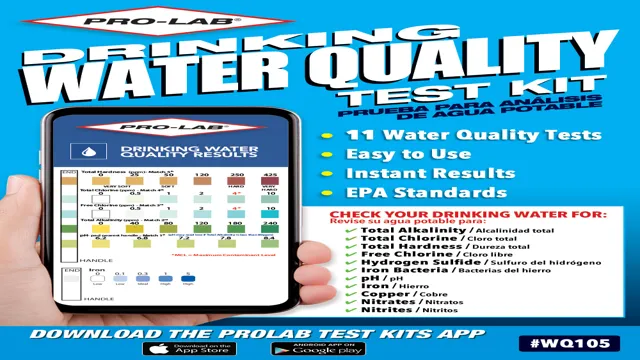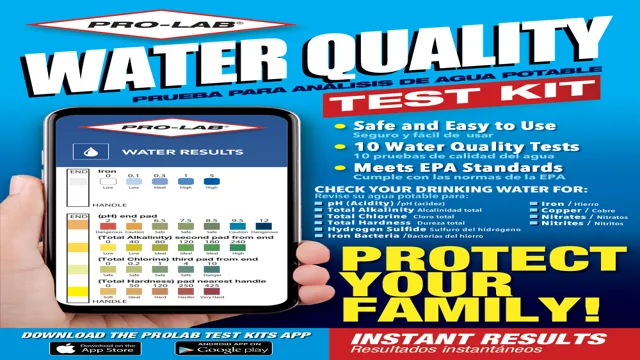Water quality is an indispensable factor not just for our health, but for the environment and ecosystem as well. Therefore, understanding, monitoring, and ensuring that the water we consume and utilize is of optimum quality is of paramount importance. For this purpose, water quality test kits serve as an essential tool.
These kits offer an easy, quick, and reliable means to assess the quality of water and identify any potential contaminants or impurities. This blog post will delve into the crucial features and benefits of using water quality test kits, providing you an in-depth analysis on how they work, their importance, and how to choose the best one for your needs. So, whether you are an environmentalist, a health-conscious individual, or someone seeking more information on water quality, this guide is your one-stop resource.

Why is Water Quality Important?
Water quality is a matter of grave importance that often gets overlooked. It’s the hidden hero, the unsung champion of our daily lives, playing a crucial role in our health, our environment, and even our economy. Its significance is precisely why water quality test kits have become indispensable tools in assessing the vitality of our water.
The essence of water quality lies in its purity. Just like a compelling novel, water should have no unexpected plot twists – no harmful bacteria, no hazardous chemicals, and no undesirable particles. Water quality test kits allow us to uncover the true story behind our water, revealing any unseen villains lurking beneath its surface.
These test kits are like detectives, investigating the quality of our water and ensuring its safety. They check for various parameters including pH levels, the presence of harmful bacteria, heavy metals, and other impurities. The results equip us with the knowledge to take appropriate actions, if necessary, to improve the quality of our water.
In essence, water quality test kits are more than just tools; they are our allies in maintaining not just our health, but the health of our planet. Thus, the importance of water quality, and by extension, water quality test kits, cannot be overstated. They ensure that the water we consume, and use is not just clean, but also safe, thereby playing a vital role in our overall well-being.
Health Implications of Poor Water
The impact of poor water quality on our health cannot be overstated. From minor ailments like diarrhea and stomach aches to severe health conditions like cholera and typhoid, unclean water brews a host of medical complications. Enter water quality test kits – the unsung heroes of modern health.
These kits, both user-friendly and cost-effective, are a key weapon in combating waterborne diseases. With an easy-to-understand analysis of key water quality parameters, they empower individuals to ensure the water they consume is safe, putting a check on potential health hazards. In essence, they are the guardians of our health, silently working to keep us in the pink of health.

Ecological Effects of Bad Water
Undoubtedly, the importance of water quality cannot be overemphasized. With the use of water quality test kits, we can assess the health of our water bodies and understand the potential ecological effects of poor water quality. These kits provide us with a quick, easy, and accurate method to measure various parameters such as pH, turbidity, and levels of harmful substances.
Poor water quality can lead to a ripple effect on ecosystems, impacting wildlife, vegetation, and ultimately, human health. So, let’s get savvy about water testing, because when it comes to preserving our planet, every drop counts.

Understanding Water Quality Test Kits
Water Quality Test Kits: A Comprehensive Breakdown When it comes to safeguarding our health and well-being, ensuring water purity is non-negotiable. Enter the heroes of our tale – water quality test kits. These kits are the unsung champions in maintaining the integrity of our water supply, whether it’s for daily consumption, recreational use, or industrial purposes.
Water quality test kits function as our frontline defense against harmful agents lurking in our water systems. They are designed to detect various contaminants such as bacteria, chlorine, lead, pesticides, and more. The beauty of these kits lies in their simplicity and accessibility.
They provide immediate results, allowing for prompt action if necessary. Each kit usually comes with an array of test strips or vials that react distinctively when exposed to different pollutants. Here’s where the magic happens: these strips or vials are dipped into a water sample and, within minutes, they change color indicating the presence (or absence) of contaminants.
This color change is then compared to a provided chart that translates these hues into measurable contamination levels. The genius of water quality test kits is their ability to democratize water testing. This means, no need for fancy laboratory equipment, or complicated procedures.
With these kits, anyone can conduct a water quality test right at home. Understanding the functionalities and benefits of water quality test kits is essential. It empowers us, equipping us with the tools to ensure the water we consume is of the highest standard.
After all, when it comes to water safety, it’s better to be in the know than left wondering.
Components of Test Kits
Water quality test kits are invaluable tools designed to analyze the health and safety of our water, contributing significantly to our overall well-being. Comprising several essential components, these kits typically include test strips or liquid reagents to detect specific contaminants. They may also contain color charts to interpret results, sample containers for water collection, and digital meters for precise measurements.
These components collectively work to detect and measure a range of impurities such as bacteria, lead, pH levels, and chlorine. Armed with the results, we can take necessary action, ensuring our water is clean and safe for consumption.
Types of Test Kits
Diving into the world of water quality test kits, one can be overwhelmed by the sheer variety. Fear not, as we demystify this ocean of options. Broadly, they fall into three categories: bacterial, chemical, and complete kits.
Bacterial kits target harmful microorganisms, ensuring your water isn’t a microscopic zoo. On the other hand, chemical kits are like your water’s annual health check-up, detecting substances such as lead, nitrates, and pH levels. Complete kits? They’re the all-in-one, water-testing superheroes.
Understanding these categories makes navigating the world of water quality test kits a splash!
How Test Kits Work
Water quality test kits serve as a scientific guardian for your health, vigilantly monitoring the safety of your water supply. These clever devices work by detecting the presence of harmful substances such as lead, bacteria, pesticides, and other pollutants. In essence, they act as an investigative tool, unmasking the invisible threats lurking in your water.
This process is simple, quick, and reliable, providing you with accurate results about the quality of your water. By leveraging the power of science, water quality test kits provide an essential defense against potential health hazards.
Using Water Quality Test Kits
Water quality test kits are indispensable tools for assessing the safety and cleanliness of our water supply. These kits, designed for the layman and professional alike, provide a comprehensive snapshot of the water’s condition, revealing essential information about its composition and potential contaminants. The importance of water quality can’t be overstated.
It plays a crucial role in sustaining life, maintaining health, and supporting the environment. However, our water sources are constantly under threat from pollution, industrial waste, and natural contaminants. This is where water quality test kits step in.
Water quality test kits are compact devices that contain a variety of testing equipment. They are designed to detect and measure different parameters such as pH levels, hardness, presence of bacteria, heavy metals, and other potentially harmful substances. These kits offer an easy-to-use, cost-effective solution to monitor and maintain water quality.
They are invaluable for households relying on well water or those concerned about the purity of their municipal water supply. The beauty of water quality test kits lies in their simplicity and convenience. With a single kit, you can conduct numerous tests at home without requiring specialized training or expensive lab equipment.
Despite their simplicity, these kits are exceptionally accurate and reliable, ensuring you have precise data about your water’s quality. In conclusion, water quality test kits are practical tools that empower individuals and communities to safeguard their water sources. They demystify the science behind water testing, making it accessible and understandable for everyone.
So, whether you’re a concerned homeowner, a passionate environmentalist, or a health-conscious individual, consider investing in a water quality test kit. It’s a small step towards a healthier life and a safer environment.
Step-by-Step Guide
Navigating the world of water quality can seem daunting, but fear not, our step-by-step guide on using water quality test kits can simplify the process. This guide is your roadmap to understanding and mastering the use of these essential tools. Dive into the nuances of water testing, demystify the jargon, and get practical tips on how to achieve accurate results.
Whether you are a concerned homeowner, an aspiring scientist, or a seasoned professional, our guide has got you covered. Brace yourself for an enlightening journey into the fascinating world of water quality testing.
Interpreting Results
Interpreting results from water quality test kits can seem like decoding an enigmatic puzzle. However, fear not, because making sense of these results is less daunting than it appears. These kits are designed to measure various aspects of water quality, such as pH levels, hardness, and the presence of harmful substances.
Interpreting the results is a matter of comparing the obtained readings to standard water quality parameters. Knowledge is power, and understanding these results empowers you to ensure the water you consume is safe and pure. So, let’s dive in to decode the mysteries of water quality test kits!
Choosing the Right Test Kit
Section Title: Navigating the Waters: A Guide to Selecting the Perfect Water Quality Test Kit In the quest for clean, safe, and healthy water, the first crucial step is assessing its quality. This is where water quality test kits come into play. These kits are the unsung heroes in our battle against water pollution, aiding us in identifying contaminants and ensuring the safety of our water supply.
Choosing the right water quality test kit, however, can sometimes feel like trying to find a droplet in an ocean. With an array of options available in the market, each boasting unique features and specifications, making the right choice can be daunting. The key to a successful selection lies in understanding your specific needs.
Are you testing for bacteria, chemicals, or heavy metals? Or maybe all three? Knowing what you’re looking for is half the battle. Once you’ve determined what contaminants you want to test for, it’s time to dive deeper into the features of different kits. Consider factors such as the range of contaminants the kit can test for, its sensitivity levels, speed of results, ease of use, and reliability.
And, of course, affordability is a significant factor, but remember not to compromise on quality for cost. It’s also worth noting that the best water quality test kits are those accredited by recognized standardization bodies. These certifications are a testament to their quality, accuracy, and reliability.
In conclusion, choosing the right water quality test kit is a vital step towards ensuring water safety. So, take your time, do your research, and make a choice that best suits your needs. After all, when it comes to water quality, there’s no room for compromise.
Conclusion
Water quality test kits are the Sherlock Holmes of the aquatic world. They provide the essential clues to the mystery that is our water – be it from the tap, a well, a pond, or even a pool. These kits are the witty investigators, cleverly revealing the unseen contaminants and chemical levels in the water. They offer us the chance not just to eliminate the unknown, but also to ensure the health and safety of our water. So, arm yourself with a water quality test kit and become a water detective, because in the battle for clean water, knowledge is indeed power.
Frequently Asked Questions (FAQs)
What are water quality test kits?
Water quality test kits are tools used to test the quality of water in various settings. They can check for a variety of contaminants and conditions, including pH, hardness, chlorine, lead, bacteria, and more.
How do water quality test kits work?
Most water quality test kits work by using reagents or test strips that react with the water sample. The resulting color change or other reaction is then compared to a chart or read by a device to determine the level of a particular contaminant or condition.
Where can I buy water quality test kits?
Water quality test kits can be purchased from a variety of sources, including home improvement stores, online retailers, and specialty scientific supply companies.
Are water quality test kits accurate?
The accuracy of water quality test kits can vary based on the specific kit and the contaminant being tested. However, many kits are capable of providing a general idea of water quality and can be useful for identifying potential problems.
Why should I use a water quality test kit?
Using a water quality test kit can help you ensure that your water is safe and healthy to use. It can identify potential contaminants or conditions that could cause health problems or affect the taste, smell, or appearance of your water.
Can I use a water quality test kit for any type of water?
Most water quality test kits are designed to test a variety of water sources, including tap water, well water, and even bodies of water like lakes and rivers. However, it’s always a good idea to check the specifics of the kit to make sure it’s suitable for your intended use.

Leave a Reply